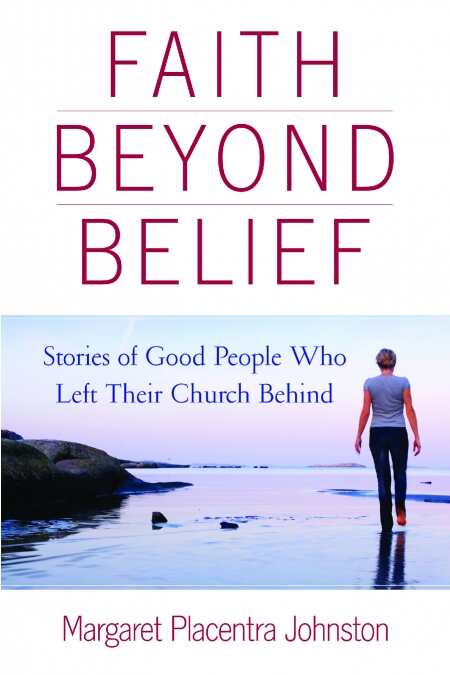Faith beyond Belief
Stories of Good People Who Left Their Church Behind
Religion can be damaging, while spirituality is freeing. So contends Johnston, whose Faith Beyond Belief introduces us to a host of religious practitioners, people whose countercultural faith relegates them to the margins of the devout—or so those who are the noisiest in favor of doctrine would have us believe. These aren’t the churchgoers your grandmother knew. Yet Johnston asserts that their rejection of mere belief in favor of sincere spiritual development represents the precise religious maturation that our ever-complicated world requires.
Johnston’s bold pages explore the hidden dynamism of what she calls mystical practice, the destination stage of personal development. Ahead of such mystics, we are introduced to those poised to seek such betterment: those in whom fundamentalism met a sharp end. For some, scriptural literalism simply couldn’t withstand growing practical knowledge; in others, the notion of a God who could love some but not all, or in whose name violence could be justified, sat uneasily with moral precepts of love and inclusion. Johnston makes use of select theories to propose that such upheavals are a somewhat inevitable part of personal growth. They represent, she suggests, moving from the stage in which conformity is a comfort into that of skeptical rationality, where one’s development of thoughtful, original values actually begins.
The book holds respect for such skeptics, notably the most vocal New Atheists like Dawkins and Hitchens. Yet Johnston remains certain that beyond disbelief lies the option of veering back toward spirituality—though without arbitrary restraints, and with an eye toward bettering the world. In defense of such a vision, she introduces us to nascent mystics, whose spirituality is about world, not just personal improvement. In Nilah, prayer ceases to be about currying the favor of a deity and moves toward pursuing wholeness; in Jean, feminist spirituality helps to heal childhood damage and to inspire a vision of “wisdom, beauty, and inclusiveness.” The “liberal theology” embraced in these stories represents, Johnston hopes, a sea change in religious practice worldwide, as it moves away from insisting on sets of answers in favor of focusing on “increasing personal responsibility toward the common good.”
Faith Beyond Belief possesses a depth that only becomes more dazzling when the reader considers that it arose outside of religious academia. While Johnston touts mystical spirituality, she maintains respectful consideration for those at all levels of spiritual development. The insightfulness of this approach, alongside the interreligious and extrareligious conversations which she encourages, should establish this book as required reading for seminarians and skeptics alike. A staggering achievement from a profoundly perceptive thinker.
Reviewed by
Michelle Anne Schingler
Disclosure: This article is not an endorsement, but a review. The publisher of this book provided free copies of the book to have their book reviewed by a professional reviewer. No fee was paid by the publisher for this review. Foreword Reviews only recommends books that we love. Foreword Magazine, Inc. is disclosing this in accordance with the Federal Trade Commission’s 16 CFR, Part 255.

